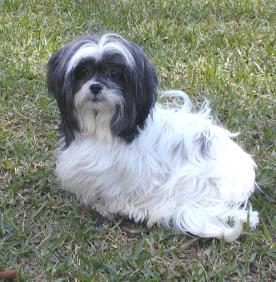Skin allergies in dogs



| Now that you've read our stories, we thought we'd give you some hints on how to find good breeders - those that don't torture and abuse their "breeding stock." Hopefully, if you go through this exercise, you'll be able to feel confident that the parents of the puppy you ultimately choose have actually been taken care of. Here are a few very important things to look for in a good breeder. 1. A good breeder DOES NOT breed mixes. Poo mixes are so popular today - but they are really nothing but mixed breed dogs. No reputable breeder would purposefully breed a shih tzu or lhasa apso with a poodle. Nor would any reputable breeder mix shih tzu and lhasas. The only reason they do this is because a "poo" is a popular concept right now and they think they can make money doing it. Many, many of the little dogs in the pounds today are poo mixes. If you want a "poo," go to the shelters. 2. A good breeder does not breed "imperial" or "miniature" or "tiny" or "teacup" shih tzu. Again, this is just a marketing concept to sell genetically-inferior dogs. Shih tzu and Lhasas have a minimum breed standard - around 8-9 pounds. Anything smaller is genetically inferior and, for health reasons, should not be bred. Irresponsible breeders often breed these tiny, sickly dogs because the public likes TINY dogs. Look at the AKC website for breed standards. The breeders who call genetically-flawed tiny dogs imperials, miniatures, tea cups, pocket puppies, or anything of that nature, are just playing on the public's love of tiny things. And if you decide to buy one, you better have a lot of money ready for your veterinarian. Not only are they over priced, as breeders know they can sell them for much more by calling them these cute names, the puppies are prone to health problems, including suppressed immune systems (meaning they get sick easily and are prone to severe allergy symptoms), brittle bones, hydrocephalus (water on the brain), open fontanel (soft spot), subluxation of the patella (slipping kneecaps), heart murmurs, cleft palate, hypoglycemia (low blood sugar), low tolerance of anesthesia, & appetite loss, that can lead to more serious illnesses. This is because most dogs this size are a result of bad breeding, inbreeding, or illness or injury prior to maturity. 3. They DO NOT advertise their puppies for sale in the newspaper or on the internet. Good breeders don't have to - they are well known with the breed clubs for quality puppies - even their pet-quality puppies are tested for all of the genetic faults that show dogs are tested for. People that have to advertise in the newspaper or on the internet obviously have something wrong with their puppies. 4. A good breeder will put you through the same careful, comprehensive "adoption" process as a good rescue does. They'll ask for a vet reference and personal references - they care about their puppies and want to ensure that they go to good homes. 5. A good breeder will give you a comprehensive, written health guarantee. 6. A good breeder will spay or neuter your puppy BEFORE you get it. Why? Because they are selling a pet quality puppy - not a show quality puppy - this means that it doesn't have the correct traits and characteristics of the breed standard. A good breeder is concerned about the offspring on which their name appears - they don't want an inferior dog being bred. 7. A good breeder will allow you to come inspect their facility. You should see a nice clean location - where the dogs are kept as pets. 8. A good breeder WILL NOT meet you on the side of a road to deliver the puppy to you for cash, only. 9. A good breeder WILL take the puppy back if, for any reason whatsoever, you cannot keep the puppy. 10. A good breeder understands that a female shouldn't be bred more than once very couple of years. A pregnancy is very difficult on a dog and they need time for their bodies to recuperate. Can you imagine a human female that gets pregnant every time she is able after giving birth? This is why many of the puppymill and breeder dogs are "worn out" by the time they are five years old. In fact, many show dogs breed only twice or three times in their entire lives. 11. Please be very wary about "registered" puppies, regardless of which registry papers the puppy may hold. Please note, many, many of the "papered" puppies that come from puppymills and unknowledgable back yard breeders are registered through very official-sounding registries, even the long-established American Kennel Club. If you want a good-quality puppy, even a pet-quality one, check out the breeder IN DETAIL. 12. Additionally, any registry is only as good as the dogs listed in the lineage of your puppy and only as good as the honesty of the breeder. There is no testing done by the any of these registries to ensure that you are getting a good puppy. The registry is simply based on the honor system. The breeder submits the paperwork, a small fee and the litter is now a registered, papered litter. 13. Finally, a good breeder has had tests done on the sires and dams to determine whether they will pass on genetic flaws. Like congenital heart problems, kidney problems or even eye problems. Ask the breeder about the types of tests they've done. You can get some ideas from the listings on the Americal Kennel Club website. We hope this has been helpful for you. We're not against all breeders, just the kind that treated us so horribly. Thank you for listening. Ginger and Cherie |
| There are other dogs still in need. Check them out! |
| Home | About Us | Available Dogs | Apply to Adopt | Apply to Foster Our Stories | Before and After | Events | Shop | Business Partners |
| The Lone Star Shih Tzu and Lhasa Apso Rescue (LSSTLAR) is an all volunteer organization dedicated to the rescue, rehabilitation and re-homing of abused, abandoned and neglected Shih Tzus and Lhasa Apsos. We are a 501(c)(3) charitable organization which means your donations may be tax deductible. Copyright 2004, Lone Star Shih Tzu and Lhasa Apso Rescue all rights reserved |
| Lone Star Shih Tzu &Lhasa Apso Rescue |
